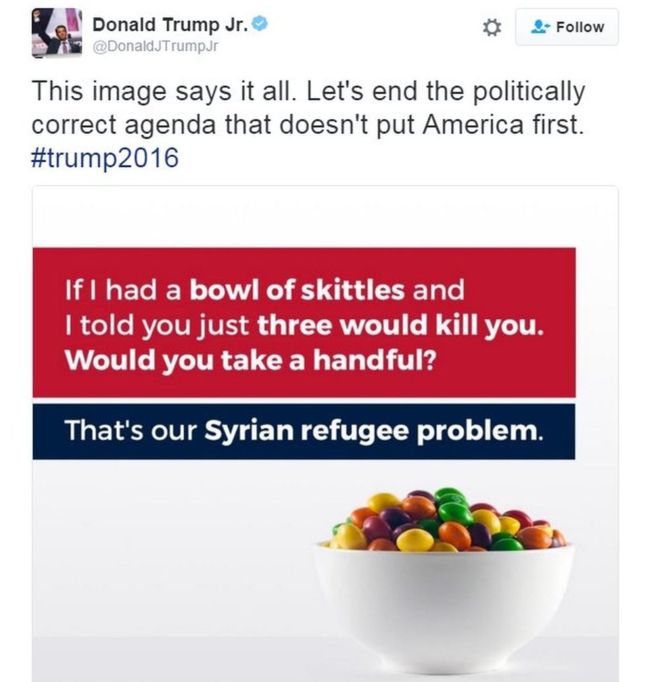history
The Secret Language of Memes
I’m breaking a promise I made to myself last year, when I decided I would not post anything related to the election on Facebook. I’m aware I have wide range of friends with a variety of political views and it seems like every time I post something political, people sweep in with their respective talking points and nothing really gets said.
But I’m breaking that promise today, hopefully for a good reason. I’m breaking it because I want to explain something that the mainstream media and cable news networks do a lousy job of explaining. I want to explain memes.
I want to explain memes because I want people who did not spend their youth hanging out on internet messages boards to understand why many people my age are losing their minds over the meme that Donald Trump Jr. posted to Twitter this week.

I know it looks like we’re overreacting. I know it gives people another excuse to shake their heads and think that we see racism under every doilie and behind every door. I’m going to try to explain to you, in a simple, common sense fashion, why memes like these are so significant.
Memes are inside jokes.
They might be pictures, they might be words, they might be a combination of both. For example, I belong to one internet message board where one of the members posts an image of a disproving bunny whenever she reads something that makes her upset.

Someone outside of the community might not understand why she does that, but we do, because it’s our inside joke. Every community has them.
Memes evolve over time.
Someone makes a joke on a message board, or on reddit or tumblr (it’s okay, you don’t have to know what any of those things are) and someone else edits it onto an image of a nervous looking dog. Someone else decides it’s the perfect metaphor for a current situation and posts it to Twitter or Facebook and it spreads.
Because of how quickly memes evolve and change, it’s hard to trace them back. Sites like Know Your Meme try, but it’s like trying to write out a dictionary in sand.
All language is affected by context, and all language changes over time. That doesn’t make it meaningless. We use words and phrases today that had different meanings 100 years ago. That’s okay. We know what it means to us and what it means to our audience. We can use it and be understood.
Memes have a message.
So when Donald Trump Jr. posts a message comparing Syrian refugees to poisoned candy, people like me aren’t just seeing words over a stock image. We’re seeing a meme. In particular, we’re seeing a meme that’s been passed around for years on white supremacist message boards and websites. Originally it was M&Ms, not skittles, but the comparison was exactly the same.
And this isn’t the first time the Trump campaign has recycled memes from the white supremacist community. Last year Trump retweeted a “crime statistics” meme that cited data from a nonexistent, but official-sounding organization. The meme claimed that black-on-white murders accounted for 81% of U.S. homicides. That’s false. The actual number reported by the F.B.I. is 15%.
The “inside joke” there is that black people are violent and white people should be afraid. Guess who agrees with that?

These are two examples, but they’re not the only ones. This is not a matter of carelessness, or coincidence. Someone in the Trump campaign has been telling inside jokes with white supremacists for a while now, and they’re counting on the fact that only white supremacists will understand them.
That’s why we’re losing our minds. It’s incredibly frustrating to be the only person on the the archaeological expedition to the old abandoned mine who sees the murderous ghost miners.

The “inside joke” to the skittles meme is that Syrian refugees are dangerous. That’s an old joke. It was old when it was leveraged against Irish and Italian and German immigrants a century ago.
They can recycle it over a new stock image (which, ironically, was taken by a photographer who was himself a refugee) but they’re still telling the same old joke. As we say on the internet, “I see what you did there.” And I’m not laughing.
The Twitter Wars of the Late 1700s
Every election season there’s a point, right about at the end of summer when rhetoric reaches an all-time high. Political ads are grainy and grim. Biblical apocalypse is imminent. People quietly block their relatives on Facebook.
You know what I find soothing in the middle of the election fervor? Listening to the Hamilton soundtrack.
In case you somehow missed this cultural phenomenon (Lord knows I almost did) I’m referring to the hip hop musical about treasury secretary and founding father Alexander Hamilton.

It’s one of those things that shouldn’t work, but it does work, and the music is amazing. Even better for history nerds like me, the songs reference some of the more eccentric details of our government’s formation.
Did you know that originally the office of the Vice President was awarded to the presidential candidate who came in second? Can you imagine?
It was supposed to prevent partisan fighting by forcing former opponents to work together, but people are people and it lasted all of three presidents.
Newspapers of the era were wholly owned by political parties,* and politicians often published letters under pseudonyms or letters written by supporters (the 17th century version of re-tweeting) to attack their opponents.
In fact the very first laws on our books about defamation were worked out because Alexander Hamilton used the “it’s not libel if it’s true” defense while attacking Thomas Jefferson in the press.
We tend to gloss over our first clumsy attempts at democracy, but one of the things Hamilton does extremely well is hit that perfect balance between idealism and realism.
For example, in one song, Thomas Jefferson boasts about the prosperity of Virginia and Hamilton raps back, “a civics lesson from a slaver/hey neighbor/your debts are paid/because you don’t pay for labor.”
The foundation of our government and our political system was a flawed landscape, and populated by characters every bit as slippery and morally questionable as the politicians of today.
And that’s why listening to Hamilton makes me feel reassured. And not just reassured, but hopeful. Because one of the other themes that runs throughout the musical is the idea that America is an experiment. At one point the titular character calls it “a great, unfinished symphony.”
We all have a part to play in this experiment. We can make things better, or we can make things worse. Just because our past is full of injustice, corruption and pettiness doesn’t mean we have to stay there.
Finally, here’s beautiful song from Hamilton about the very first presidential farewell address.
___
*The Whistlestop podcast did a really excellent episode recently about political journalism in this era. You can listen to the whole thing here.